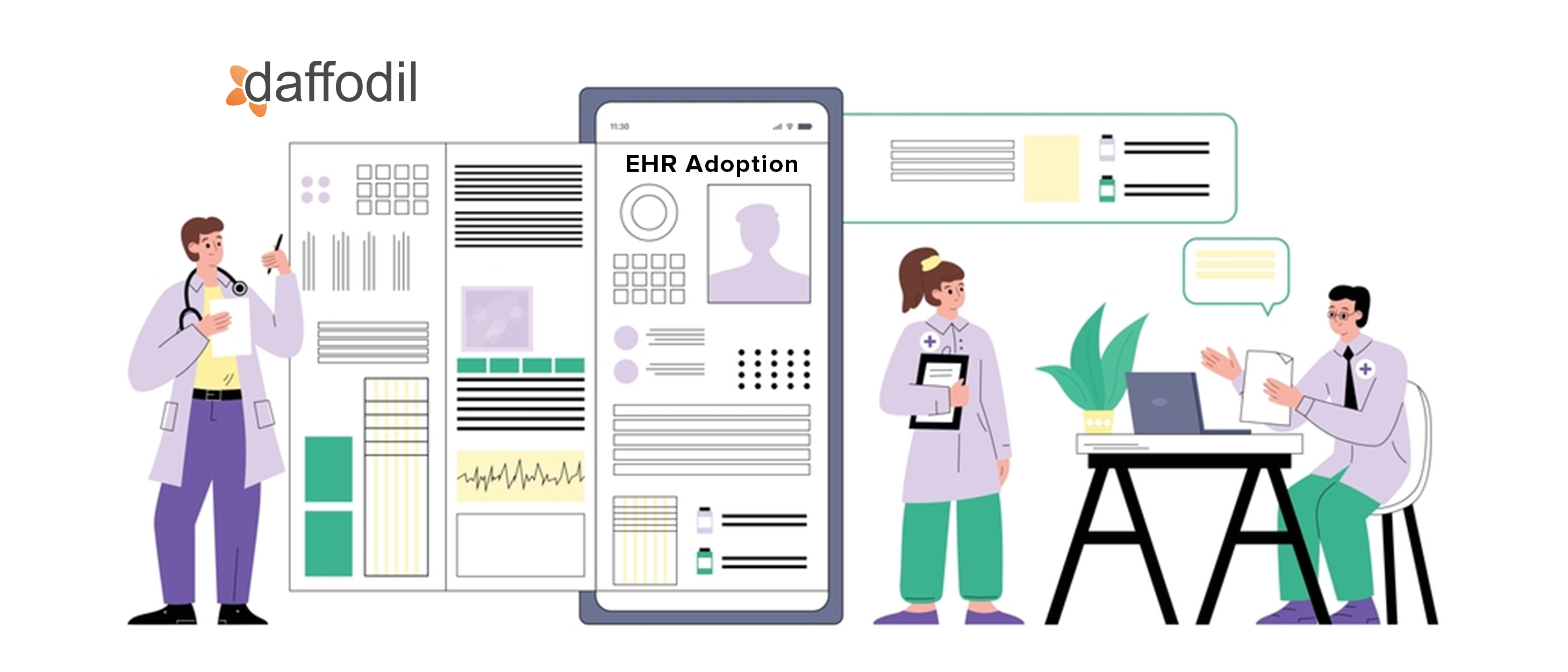
Electronic Health Records (EHR) have completely transformed the way hospitals operate and enhanced the quality of care delivery. Scheduling appointments, allocating prescriptions, and viewing diagnostic data have all become simple processes because of EHR-based digitalization. However, there remain many bottlenecks that have stood in the way of seamless industry-wide adoption of EHR.
EHRs have been lauded as a game-changer for the healthcare industry, allowing for finer patient care, enhanced efficiency, and lessened costs. However, the adoption of EHR systems has not been without its challenges. In this blog, we will explore the challenges of EHR adoption and discuss ways to overcome them.
The Challenges of EHR Adoption
The challenges of EHR adoption include system complexity, cost implications, resistance to change, workflow disruptions, data migration, interoperability issues, and potential breaches of data security and privacy. Addressing these challenges proactively is critical for successful EHR adoption and can be done in the following ways:
Stretching the Budget
It is inarguable that the adoption of new technology becomes a financial burden, at least in the initial phases. EHR systems tend to be expensive to purchase and integrate which makes them inaccessible for smaller healthcare setups. Additional expenses such as those associated with maintenance, upgrades, and training the workforce can be hard for some organizations to bear.
Complexity of Implementation
The implementation of an EHR into a healthcare organization's existing data and workflow management system can be a highly technical endeavor. Without the right expert to carry this out, the complexity can be difficult for a random IT engineer to successfully understand and implement. Staff can be resistant to the need to disrupt everyday operations for the installation of said EHR and there is significant planning because of the lack of plug-and-play options.
Interoperability Problems
Healthcare organizations that lack an in-depth understanding of how EHRs operate tend to integrate multiple solutions lacking seamless interoperability among them. Disparate subsystems within a singular organization mean that sharing of patient data between these systems becomes complicated leading to errors, redundancies, duplication, and mismanagement.
Slow Change
Finally, a significant challenge of EHR adoption is resistance to change. Healthcare providers may resist adopting new technologies, especially if they are comfortable with their current systems. Staff may also resist changes in workflows and processes, which can disrupt daily operations.
Security and Compliance Concerns
EHR systems contain sensitive patient information, which raises concerns about data security and privacy. Healthcare providers must ensure that their EHR systems comply with regulatory requirements, such as HIPAA, to protect patient data. Additionally, healthcare providers must be vigilant about cybersecurity threats, such as ransomware attacks, which can compromise EHR systems.
How to Overcome the Challenges of EHR Adoption
EHR adoption has revolutionized the healthcare industry, but it also comes with its own set of challenges. We will explore how to overcome these challenges, including issues related to technology, workflow disruption, training, and resistance to change. By addressing these obstacles head-on, healthcare organizations can successfully implement EHR systems, improve patient care, and enhance overall operational efficiency:
Develop a Comprehensive Implementation Plan
To overcome the complexity of EHR implementation, healthcare providers must develop a comprehensive implementation plan. This plan should include timelines, budgets, and milestones, as well as a clear communication strategy to keep staff informed of progress. The plan should also include a strategy for customization and training to ensure that the EHR system meets the specific needs of the healthcare provider.
Create a detailed timeline, allocate resources, and design new workflows. Provide comprehensive training, test and optimize the system, and continuously monitor progress. Support and maintain end-users for sustained EHR adoption.
Prioritize Data Security and Privacy
To address data security and privacy concerns, healthcare providers must prioritize these issues during the implementation process. This includes ensuring that the EHR system complies with regulatory requirements, such as HIPAA, and implementing cybersecurity measures to protect against threats. Additionally, healthcare providers should develop policies and procedures for data access and use to ensure that patient data is only accessed by authorized personnel.
Develop policies and procedures to protect patient information and comply with relevant regulations. Train staff on security best practices and monitor for breaches. Invest in cutting-edge cybersecurity solutions and stay updated with industry standards. Prioritize patient trust and confidentiality, and safeguard sensitive data to ensure secure EHR adoption.
Address Interoperability Issues
Interoperability can be addressed by implementing EHR systems that are designed to be interoperable, or by implementing middleware solutions that allow different EHR systems to communicate with each other. Healthcare providers should also work with other providers in their network to develop standards for sharing patient data.
Addressing interoperability issues is crucial for seamless EHR adoption. Establish data exchange standards, use HL7 and FHIR protocols, and implement interoperability frameworks. Foster collaboration among different EHR systems and vendors to ensure smooth data sharing and meaningful use of electronic health records.
Provide Adequate Training and Support
Resistance to change can be addressed by providing adequate training and support for staff. Healthcare providers should invest in training programs that help staff understand the benefits of the EHR system and how to use it effectively. Additionally, providers should ensure that there is adequate technical support available to help staff troubleshoot issues and answer questions.
Providing adequate training and support is essential for successful EHR adoption. Offer comprehensive training programs for all users, including clinicians, staff, and patients. Offer ongoing support and troubleshooting to ensure proficient and confident use of the EHR system.
Emphasize the Benefits of EHR Adoption
Finally, healthcare providers should emphasize the benefits of EHR adoption to staff and patients. EHR systems can improve patient care by providing access to comprehensive patient data, reducing errors in medication management, and facilitating communication between providers.
Emphasizing the benefits of EHR adoption is crucial to driving acceptance. Highlight improved patient care, streamlined workflows, enhanced efficiency, and data-driven decision-making. Communicate the positive impact on clinical outcomes, patient satisfaction, and organizational performance to motivate EHR adoption.
ALSO READ: Breaking the Misconceptions About an EHR System
Ensure Efficient EHR Adoption for Ideal Healthcare Outcomes
adopting Electronic Health Records (EHRs) is a critical step towards modernizing healthcare and improving patient care. Despite challenges and barriers, the benefits of EHR adoption, such as improved accuracy, efficiency, and accessibility of medical information, far outweigh the initial investment. As healthcare continues to evolve, EHRs are becoming an essential tool for healthcare providers and organizations to enhance patient outcomes, streamline workflows, and deliver high-quality care in the digital age. If you are looking for a similar enterprise healthcare solution, you can book a free consultation with our Healthcare Software Solutions team.



